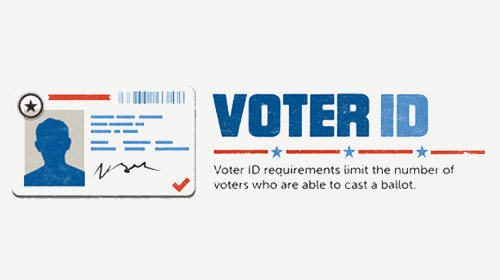document
Emergency Motion to Block Wisconsin Voter ID Law March 2015
Document Date:
March 23, 2015
Download document
The American Civil Liberties Union filed an emergency motion on March 23, 2015 with a federal appeals court to keep Wisconsin's voter ID law from immediately taking effect. The action occurred after the U.S. Supreme Court declined the ACLU's request to review a lower court ruling that upheld the law.
Related Issues
Related Content
-
WisconsinDec 2016

Voting Rights
Frank v. Walker: Fighting Voter Suppression in WisconsinFrank v. Walker: Fighting Voter Suppression in Wisconsin
Wisconsin’s voter ID law is one of the harshest in the country and requires voters to produce one of a few specified forms of photo identification in order to vote. This restriction imposes a substantial burden on the right to vote by requiring photo identification that many voters do not have, and that many voters cannot easily obtain, in violation of the Fourteenth Amendment of the Constitution. In addition, the Wisconsin voter ID law violates Section 2 of the Voting Rights Act, which prohibits the use of voting practices that have a negative impact on racial and language minorities. The law has a disproportionate impact on black and Latino voters, who are twice as likely to lack photo ID accepted for voting in Wisconsin compared to white voters. -
Press ReleaseMar 2015

Voting Rights
ACLU Moves to Block Wisconsin Voter ID Law Following Supreme Court ActionACLU Moves to Block Wisconsin Voter ID Law Following Supreme Court Action
FOR IMMEDIATE RELEASE March 23, 2015 CONTACT: Inga Sarda-Sorensen, 212-284-7347, isarda-sorensen@aclu.org WASHINGTON – The American Civil Liberties Union filed an emergency motion with a federal appeals court to keep Wisconsin's voter ID law from immediately taking effect. The action occurred after the U.S. Supreme Court today declined the ACLU's request to review a lower court ruling that upheld the law. The voter ID law was struck down by a federal trial court in April 2014, but that decision was overturned by the 7th U.S. Circuit Court of Appeals. Until today, the law had been placed on hold by the Supreme Court while it considered whether to hear the case. Given today's action, the ACLU is asking the appeals court to extend the stay in order to prevent a sudden change in requirements while voting is underway in the April 7 general election. Absentee ballots have already been sent to voters, and early in-person voting began this morning. Dale Ho, director of the ACLU's Voting Rights Project, said: "Although the Supreme Court has declined to take this case, it previously made clear that states may not impose new requirements for voting in the weeks before Election Day. The situation is even more compelling here because absentee ballots have already been mailed out for the April election, and early in-person voting has begun. Imposing a new restriction in the midst of an election will disenfranchise voters who have already cast their ballots. It is a recipe for disaster." The ACLU is challenging the law on behalf of numerous Wisconsin voters, charging the measure violates the 14th Amendment's equal protection clause and Section 2 of the Voting Rights Act. The ACLU, the ACLU of Wisconsin, the National Law Center on Homelessness & Poverty, and Dechert LLP are co-counsel in this case, Frank v. Walker. The Supreme Court petition was jointly filed with the League of United Latin American Citizens (LULAC), represented by Arnold & Porter and the Advancement Project. LULAC has also joined the ACLU’s motion to put Wisconsin’s ID law on hold through the April 7 election. The emergency motion is at: https://www.aclu.org/voting-rights/emergency-motion-block-wisconsin-voter-id-law-march-2015 More information is at: https://www.aclu.org/voting-rights/frank-v-walker-fighting-voter-suppression-wisconsin